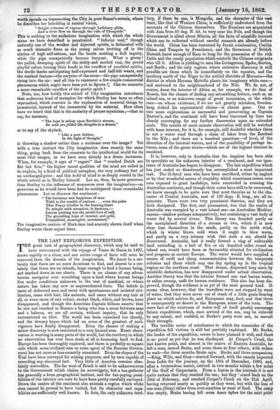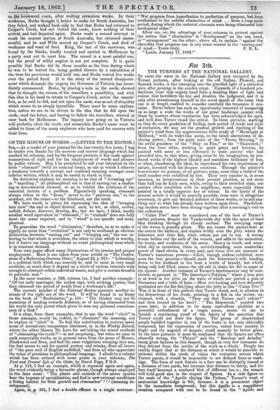THE LAST EXPLORING EXPEDITION.
THE great task of geographical discovery, which may be said to have commenced with the voyage of Vasco de Gama in 1497, draws rapidly to a close, and one entire range of facts will soon be removed from the domain of the imagination. We know to a cer- tainty that there are no more Americas to find, and almost to a cer- tainty that there are no islands, large enough to feed a human being, not marked down in our charts. There is no chance of any adven- turous navigator ever stumbling upon a land where human beings live under conditions unknown to the rest of mankind, or where nature has taken any new or unprecedented form. The beliefs in races of deformed men and races with spontaneous and isolated civi- lization, races with hair, like animals, and races without any hair at all, or even races of any colour, except black, white, and brown, have disappeared, and though the American Captain Gibson asserts that he saw and touched in Borneo a being who was a cross between man and a baboon, we are all certain, without inquiry, that he only encountered an idiot. The world has been examined too closely, and the dreamy hopes which led on some of the greatest of navi- vigators have finally disappeared. Even the chance of making a minor discovery is now restricted to a very limited area. Exact obser- vation is wanting in many parts of the world, but the territory in which no observation has ever been made at all is becoming hard to find. Europe has been thoroughly explored, and there is probably no square mile which some civilized man or some agent of the Russian Govern- ment has not more or less cursorily examined. Even the slopes of the Ural have been surveyed for mining purposes, and by men capable of recording any abnormal fact. Very little of America remains abso- lutely untrodden. The far west of Brazil is said to be unknown even to the Government which claims its sovereignty, but a tax-gatherer has generally a keen geographical instinct, and the tax-paying possi- bilities of the interior are sure to have been pretty carefully surveyed. Down the centre of the continent also extends a region which white men cannot be proved to have visited, but its character and capa- bilities are sufficiently well known. In Asia, the only unknown terri- tory, if there be one, is Mongolia, and the character of this vast tract, like that of Western China, is sufficiently understood from the accounts of the Chinese themselves. The Russians are acquainted with Asia from 50 deg. N. lat. to very near the Pole, and though the Government is silent about Siberia, all the facts of scientific interest which can be collected without careful research are already before the world. China has been traversed by esuit missionaries, Cochin China and Tonquin by Frenchmen, and the Governors of British Burmah know enough of Siam to long for the possession of the rich Delta and the manly population which controls the Chinese emigrants who till it. Africa is yielding to men like Livingstone, Speke, Burton, and Barth; and the only regions where extensive discovery is still possible are those which lie immediately on the equator, and the territory north of the Niger to the settled districts of Morocco—the district in which Herman Melville plants his imaginary white race— and eastward to the neighbourhood of the Nile. We do not, of course, know the interior of Africa as, for example, we do that of Russia, but the chance of finding any astonishing feature, such as an inland sea, or an unknown range of great mountains, or the white race—on whose existence, if we are not greatly mistaken, Sweden- borg staked his supernatural claims—is almost gone. One or two more explorations as successful and persevering as Captain Burton's, and the continent will have been traversed by lines too closely converging for any further discoveries upon an extended scale. The results of more minute observation will still be watched With keen interest, for it is, for example, still doubtful whether there is not a water road through a chain of lakes from the Zambesi to the Nile ; and there are a hundred questions—of level, of the direction of the internal waters, and of the possibility of portage be- tween some of the great rivers—which are of the highest interest to mankind.
It is, however, only in Australia that the inquirer has been able to speculate on the unknown interior of a continent, and our igno- rance of Australia has begun to disappear. The last expedition which has just ended so disastrously has accomplished a most important task. The ill-fated men who have been sacrificed, either by neglect or by that wonderful access of stupidity which sometimes comes over men exposed to great hardships, have succeeded in crossing the Australian continent, and though their notes have still to be recovered, we know enough to be quite sure that most theories as to the cha- racter of Central Australia, east of 137 degs. E. long., are all in- accurate. There were two very prominent theories, and, they are both dissipated. The first, and pleasantest, was that the centre of Australia was occupied by a vast inland sea—an Australian Mediter- ranean—shallow perhaps comparatively, but containing a vast body of water fed by several rivers. This theory was founded partly on the unexplained direction of a stream or two, which it is now clear lose themselves in the sands, partly on the north wind, which in winter blows cold when it ought to blow warm, and partly on a very intense wish that such a sea should be discovered. Australia, had it really formed a ring of culturable land, extending in a belt of five or six hundred miles round an inland sea, would have been as favourably situated for civilization and progress as ancient Europe. The water would have supplied a means of swift and cheap communication between the temperate colonies and those which may one day spring up in the tropical region on the northern coast. That dream, dispersed long since by scientific deduction, has now disappeared under actual observation. Another theory was that the interior formed one vast barren waste, or saline swamp, unfit for human residence. This also has been dis- proved, though the evidence is as yet of the most general kind. It seems clear, however, that the travellers were not stopped by want of water, that they were never out of reach of a little grain-bearing plant on which natives do, and Europeans may, feed, and that there is consequently no desert in the European sense of the term. The mere fact of the existence of water will of itself greatly encourage future expeditions, which, once arrived at the sea, may be relieved to any extent, and enabled, as Burke's party were not, to recruit their strength.
The terrible series of mischances to which the remainder of the expedition fell victims is still but partially explained. Mr. Burke, the leader of the expedition, seems to have planned it well, and there is no proof as yet that he was disobeyed. At Cooper's Creek, the last known point, and almost in the centre of Eastern Australia, he left a man, named Bralie, and some three or four others, with orders to wait—for three months Brahe says. Burke and three companions —King, Wills, and Gray—started forward, with the camels imported from India for the journey, on the 16th of December, 1860, and, after a tremendous march, arrived in two months within a few miles of the Gulf of Carpentaria. From a hiatus in the journals it is not quite certain that they reached the sea; but they 'armed back on the 19th of February, and reached Cooper's Creek on the 21st April, having returned nearly as quickly as they went, but with the loss of one man (Gray) either from over-exertion or want of food. The camp was empty, Brahe having left seoett hours before for the next point on the homeward route, after waiting seventeen weeks. In their "Not progress from imperfection to perfection of purpose, but from weakness, Burke thought it better to make for South Australia, but they failed, and walked back only to find that Brahe had returned to Cooper's Creek, bad not visited the cache, knew nothing of their arrival, and had departed again. Burke made a second attempt to reach the nearest station of South Australia, but returned unsuc- cessful, and he and Wills moved up Cooper's Creek, and died of weakness and want of food. King, the last of the survivors, was found by the blacks, kindly treated and carried to Melbourne by a party sent out to meet him. The record is a most painful one, but the proof of wilful neglect is not yet complete. It is quite possible that Burke did fix three months as the time during which he was to be waited for, being guided thereto by a calculation of the time his provisions would hold out, and Brahe waited five weeks over the period fixed. It is the story of the second disappoint- ment which demands the inquiry the Governor of Victoria has imme- diately commenced. Brahe, by placing a note in the cache, showed that he thought the return of the travellers a possibility, and with this idea in his head to return to Cooper's Creek, notice the camels' feet, as he said he did, and not open the cache, was an act of stupidity which seems to us simply incredible. There must be some explana- tion, unless we are to be driven to the idea that he did open the cache, read the letter, and fearing to follow the travellers, started at once back for Melbourne. The inquiry now going on in Victoria will probably elicit the truth, and meanwhile Burke's name must be added to those of the many explorers who have paid for success with their lives.































 Previous page
Previous page